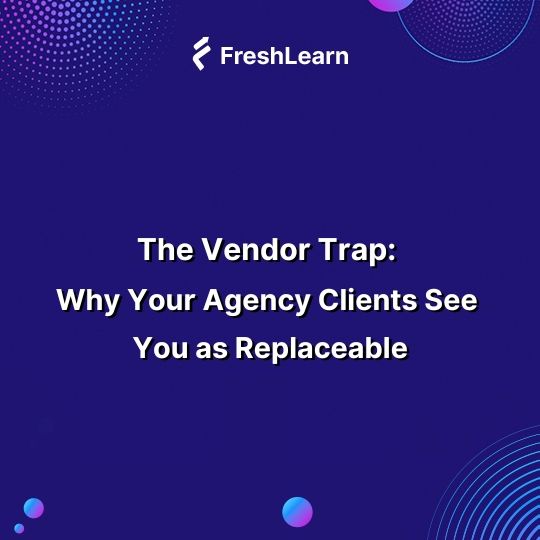
Here's the uncomfortable truth: Your clients don't see you as the expert they hired anymore. They see you as a vendor. A replaceable line item in their budget.
You're great at landing clients.
The proposal was fire. The pitch was flawless. They signed the contract with genuine excitement.
But somewhere between "Welcome to the team!" and Month 3, something... shifts.
The enthusiasm fades. The questions pile up. They start asking if certain things are "included" or "extra." And when renewal time comes around, they casually mention they're "evaluating options."
Translation: They're price-shopping you against three other agencies who promise to do the same thing for 30% less.
Here's the uncomfortable truth: Your clients don't see you as the expert they hired anymore.
They see you as a vendor. A replaceable line item in their budget. The agency equivalent of their internet provider — necessary, but not exactly irreplaceable.
And let me tell you from years of business experience: The moment someone sees you as replaceable, you've already lost leverage.
So let's talk about how you got stuck in the Vendor Trap — and more importantly, how to escape it.
Why Clients See You as a Vendor (Even When You're Doing Great Work)
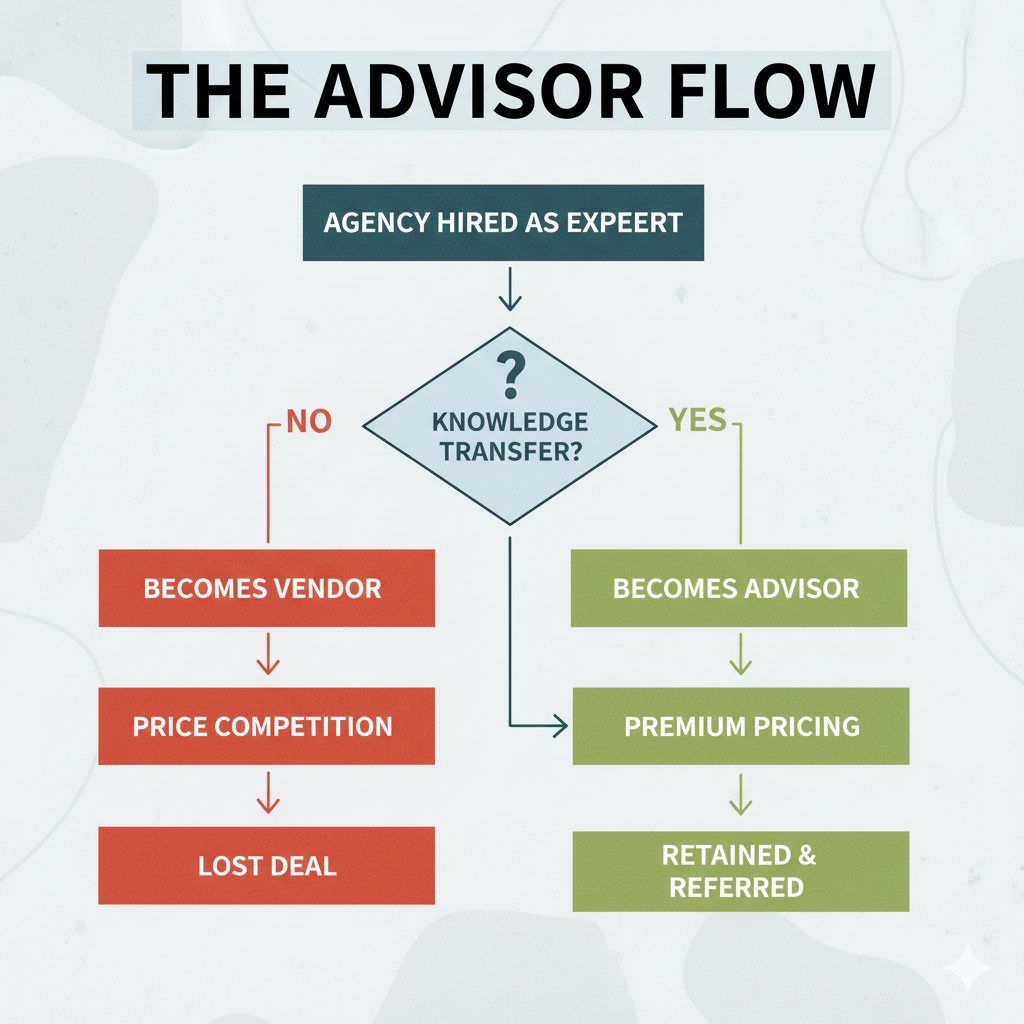
Here's what's probably happening (and be honest with yourself here):
1. You Deliver Services, Not Education
You're implementing campaigns. Managing their HubSpot. Delivering monthly reports that make their eyes glaze over.
But here's the problem: They don't understand WHY you're doing what you're doing.
In their mind:
- Workflows? "I'm sure anyone can set those up."
- Landing pages? "We could probably hire a freelancer for that."
- Reports? "Lots of numbers. Cool. But what does this mean?"
You're doing expert-level work, but they're seeing commodity-level output.
It's like watching a master chef cook. If you don't understand the technique, the timing, the why behind each ingredient — you just see someone throwing food in a pan.
"I could probably do that myself" (Narrator: They could not.)
2. Your Onboarding Screams "Vendor"
Let's be real about your current onboarding:
Day 1:
- "Welcome aboard! Here's a Slack invite."
- "Here's our project management tool login."
- "Let me send you another email with our communication plan."
- "Oh, and here's a PDF with our process. It's 47 pages. You'll definitely read it." (They won't.)
Your client's internal monologue:
"This looks exactly like the last three agencies we worked with. Same tools. Same chaos. Same 'we'll figure it out as we go' energy."
First impression = Vendor status confirmed.
3. You Compete on Deliverables, Not Outcomes
Your proposals look like this:
- 10 email workflows
- 20 landing pages
- 50 blog posts
- Monthly reporting
The problem? Deliverables are commoditized.
Every agency can promise deliverables. The cheaper agency down the street? They're promising the SAME deliverables for $3,000 less per month.
And your client is thinking: "I mean, a workflow is a workflow, right?"
(Wrong. But they don't know that because you haven't taught them the difference.)
4. There's No Knowledge Transfer
Here's the irony that kills me:
The more dependent your clients are on you, the more they resent paying you.
Why? Because deep down, they feel like they SHOULD understand this stuff.
They're smart people running successful companies. And here they are, having to ask you to change a single line of copy in a workflow because they have no idea how it works.
They feel stupid. And nobody likes paying someone who makes them feel stupid.
(Even if you're not trying to make them feel that way. Even if you're being helpful. The dependency itself breeds resentment.)
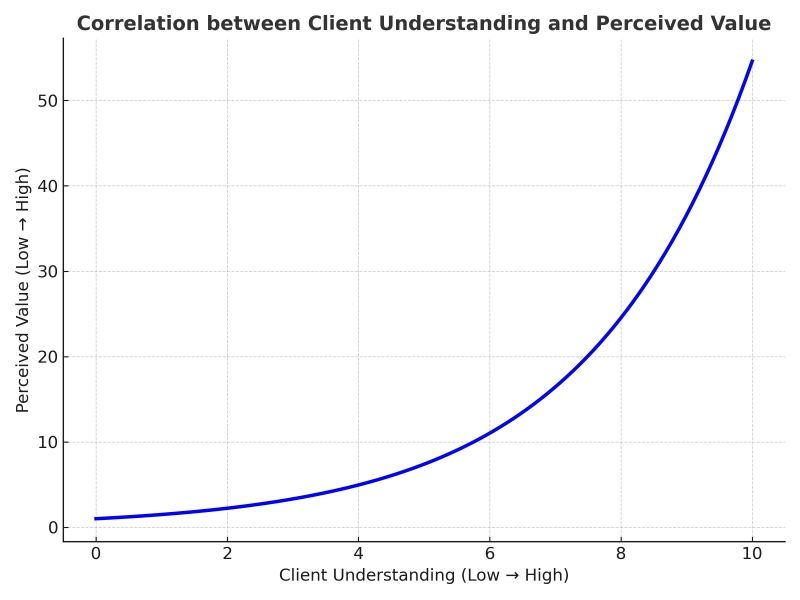
The Pattern:
You're doing great work.
But your clients don't see the expertise behind it.
They just see the output.
And output? That's easy to price-shop.
The Vendor vs Advisor Difference (And Why It Matters)
Let me show you something that'll make this crystal clear:
| VENDOR | ADVISOR |
|---|---|
| Executes tasks clients request | Teaches strategy clients didn't know they needed |
| Delivers campaigns | Builds client capability |
| Answers questions when asked | Proactively educates before problems arise |
| Competes on price ("We're cheaper!") | Competes on expertise ("We know this industry.") |
| Client calls when there's a fire | Client calls before making ANY marketing decision |
| Seen as cost center ("expense") | Seen as growth partner ("investment") |
| Gets replaced when budget tightens | Gets protected when budget tightens |
| Replaceable | Irreplaceable |
Here's the data.
Vendor Agencies
- Client retention: 60-70%
- Average price resistance: High
- Referral rate: 15-20%
Advisor Agencies
- Client retention: 85-95%
- Average price increase at renewal: 15-25%
- Referral rate: 45-60%
Translation: Advisors keep clients longer, charge more, and get more referrals.
Not because they're doing different work.
Because they're teaching clients WHY the work matters.
Real Talk: The Advisor Advantage
I've seen this across countless business negotiations:
The person who teaches has the power.
When you teach your clients:
- Why you structured the campaign this way
- What metrics actually matter (and which ones are vanity)
- How to think about their marketing strategically
You're no longer "the agency we hired to run HubSpot."
You're "the advisor who helps us make better decisions."
And advisors don't get price-shopped.
How to Make the Shift: From Vendor to Advisor in 3 Steps
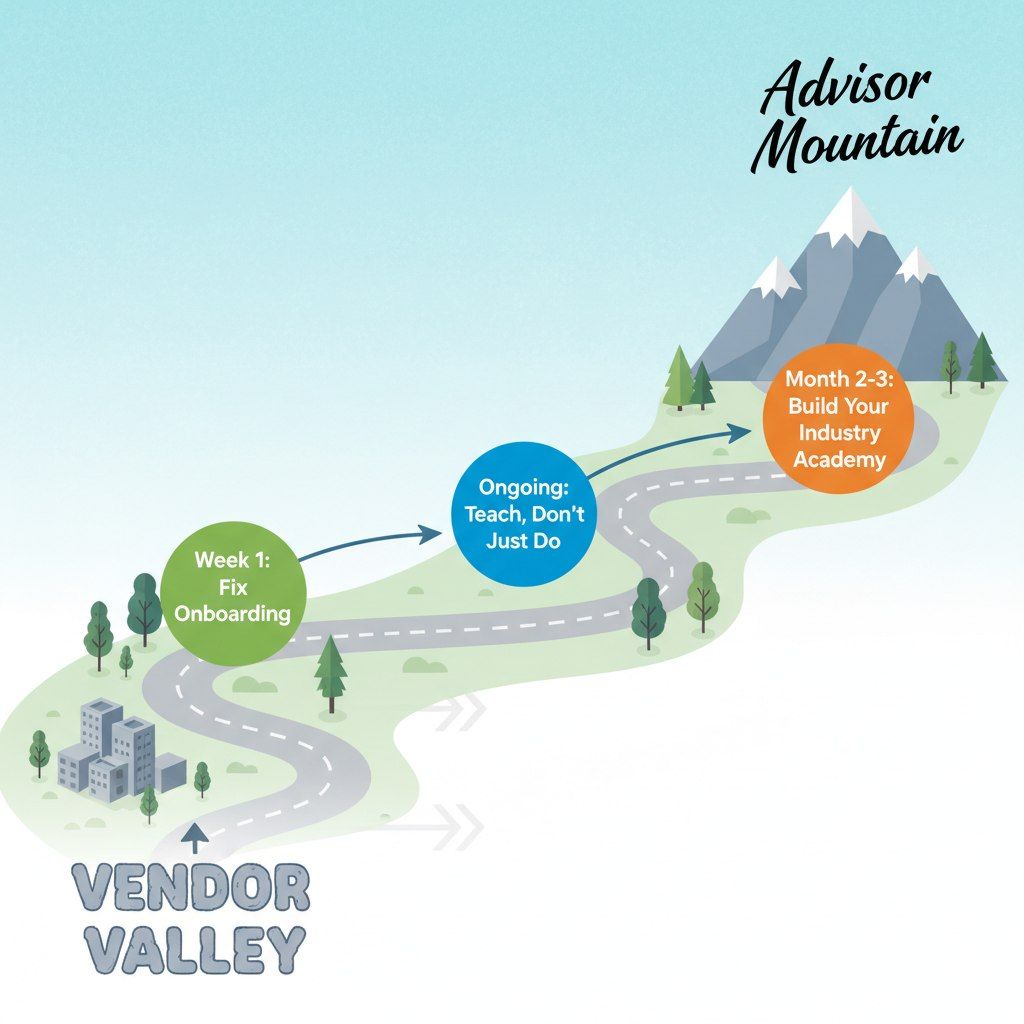
Alright, enough diagnosis. Let's fix this.
STEP 1: Change Your Onboarding (This Week)
Stop doing this:
- Slack invite
- Project management link
- "Let me send you another email with the details"
- 47-page PDF nobody will read
Start doing this:
- Branded client academy
- Welcome video from YOU (yes, your face, not just your logo)
- Structured learning path
So, here's what to include in your academy.
Module 1: How We Work Together
- Communication plan (who to contact, when, and why)
- Escalation matrix (what's urgent vs. what can wait)
- Project timeline (here's what happens next)
- The vibe: "We've done this 100 times. You're in good hands."
Module 2: Industry Best Practices
- Not generic marketing advice
- Specific insights about THEIR industry through YOUR lens
- The vibe: "We know your world better than you expected."
Module 3: HubSpot Foundations
- So they're not calling you to change a button color
- Basic navigation, common tasks, where to find things
- The vibe: "We're empowering you, not gatekeeping."
Module 4: Templates & Frameworks
- Email templates they can customize
- Campaign checklists
- Strategy frameworks
- The vibe: "Here are tools you can use even without us." (Counterintuitive, but this INCREASES your value.)
The Psychology:
Within 24 hours of signing, your client thinks:
"Holy shit. These people are DIFFERENT. This is the most organized onboarding I've ever experienced. We made the right choice."
First impression = Advisor, not Vendor.
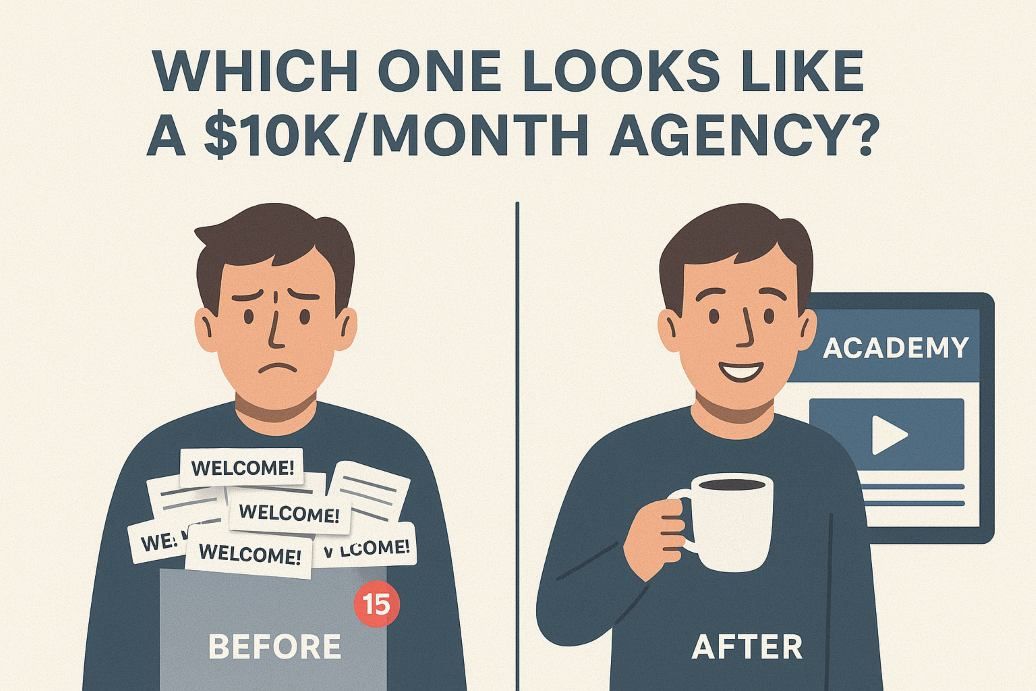
STEP 2: Teach, Don't Just Do (Ongoing)
Here's the formula that changes everything:
Deliverable + Education = Advisor Status
Every time you deliver something, add a teaching layer.
Bad (Vendor approach):
"Here are your 10 new workflows. They're live."
Good (Advisor approach):
"Here are your 10 new workflows. I recorded a 5-minute video walking you through:
- Why we structured them this way
- What metrics to watch
- How to optimize them as you learn more about your audience
- Common mistakes to avoid
Watch it when you have time. Questions? Let me know."
Here are some more examples.
| Deliverable | + Education = Advisor Move |
|---|---|
| Campaign launch | "Here's a 3-minute video on why we chose this strategy over alternatives" |
| Monthly report | "Here's what the numbers mean + what we should test next month" |
| Strategy call | "Here's the framework we just used. You can use this internally for other projects." |
| New landing page | "Here's the psychology behind why we structured it this way" |
The shift can happen like this:
You're not just delivering work.
You're building their capability to understand the work.
And when they understand WHY you're doing what you're doing?
They stop seeing you as replaceable.
STEP 3: Create Your Industry Academy (Month 2-3)
This is the game-changer.
Most agencies are horizontal: "We do HubSpot for everyone!"
The agencies charging 2-3x more are vertical: "We ONLY do HubSpot for [specific industry]."
But you don't have to fire all your clients to go vertical.
You can layer specialization on top of your current business.
Here's how:
Pick ONE of your best clients' industries:
Not your biggest client. Your favorite client.
The industry where:
- You already understand their pain
- You've gotten them real results
- You genuinely enjoy the work
Examples:
- Healthcare marketing
- SaaS growth
- Manufacturing lead gen
- Financial services
- Professional services (consultants, lawyers, etc.)
- Real estate
Build a "[Industry] Marketing Academy"
Here's what to include.
1. Industry-Specific Best Practices
- Not "how to use HubSpot"
- But "how healthcare providers should think about patient acquisition"
- Or "how manufacturers can generate qualified B2B leads"
2. Case Studies from Their Industry
- "Here's how we helped a company like yours grow from $2M to $10M"
- Social proof that you KNOW this industry
3. Templates Tailored to Their Industry
- Email sequences that work in healthcare (not SaaS)
- Landing page frameworks for manufacturing buyers (not ecommerce)
4. Common Mistakes in Their Industry
- "The 5 things healthcare marketers get wrong about HIPAA compliance"
- Positions you as the expert who's seen it all
Now, let's talk about the strategy.
Month 1-3:
- Give this academy to your clients in that industry
- Use it in sales pitches for new clients in that industry
- Suddenly, you're not "another HubSpot agency"
- You're "THE healthcare HubSpot experts" (or whatever industry you picked)
Month 4-6:
- Start marketing yourself as the specialist
- The academy is your proof
- New clients in that vertical start finding you organically
Month 7-12:
- You're now charging 2-3x competitors
- You're closing deals faster (less price resistance)
- You're getting referrals within that industry
You haven't turned away any clients. You've just layered expertise on top.
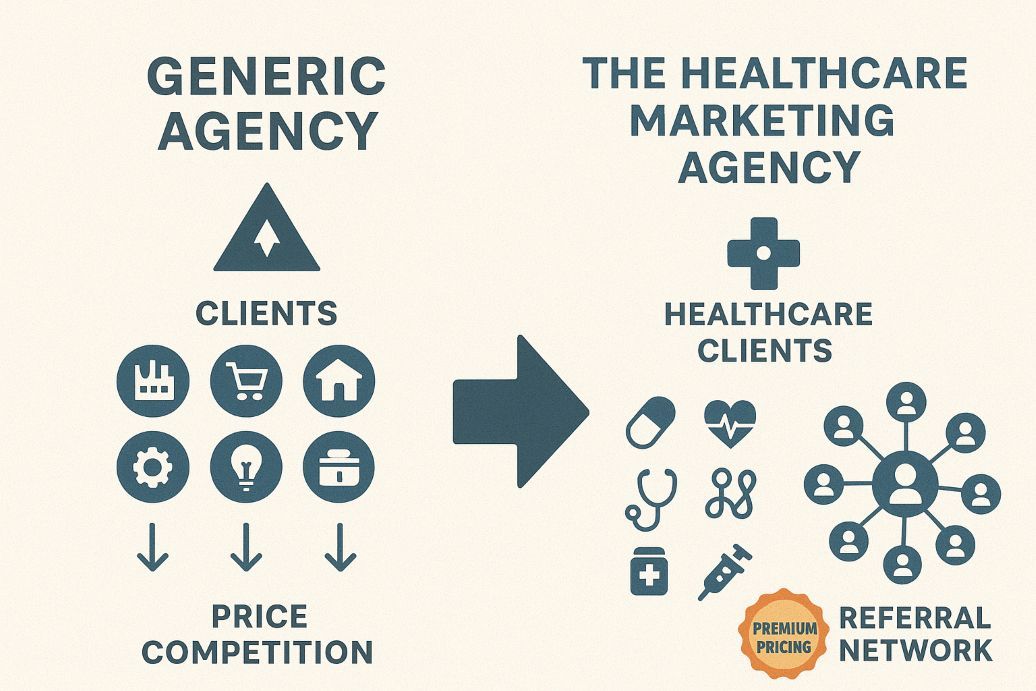
Let's look at an example from my experience.
I consulted with an agency in 2023 that did this exact thing.
They were a horizontal HubSpot agency serving everyone. Competing on price. Losing clients to cheaper agencies every quarter.
They picked SaaS (their favorite clients).
Built a "SaaS Growth Academy" in 3 weeks.
Within 6 months:
- Closed 8 new SaaS clients at 2.5x their old pricing
- Existing SaaS clients renewed at 90% (vs 65% before)
- Got 5 referrals from a single happy SaaS client
They didn't fire their non-SaaS clients.
They just stopped marketing to them and focused on SaaS.
Within 18 months, 80% of their book was SaaS clients.
Revenue up 140%. Stress down 60%. (Okay, I made up the stress number, but they told me they sleep better now.)
"But This Sounds Like a Lot of Work..."
I hear you.
You're thinking:
- "I don't have time to build an academy"
- "I'm not a course creator"
- "This will take months"
Here's the truth: You already have the content.
Think about it:
- That onboarding deck you send every client? Content.
- The training videos you've recorded for clients? Content.
- The internal frameworks your team uses? Content.
- The templates you send in email? Content.
- The "best practices" doc sitting in your Google Drive? Content.
You don't need to create from scratch. You need to organize and brand what you already have.
What you actually need:
A platform that integrates with HubSpot
- Your clients are already in HubSpot
- Don't make them go to another tool
Branded academies
- White-labeled
- Looks like YOUR agency, not a generic course platform
- Your logo, your colors, your domain
Simple setup
- 2 hours, not 2 months
- No coding required
- Upload videos, organize modules, done
Client-facing, not public
- This isn't about selling courses online
- This is about serving clients better
- Private academies for YOUR clients
The reality is this. Agencies using branded training academies:
- Close deals 23% faster
- Retain clients 15-20% longer
- Charge 2-3x more than agencies who just "do the work"
Because they've made the shift from vendor to advisor.
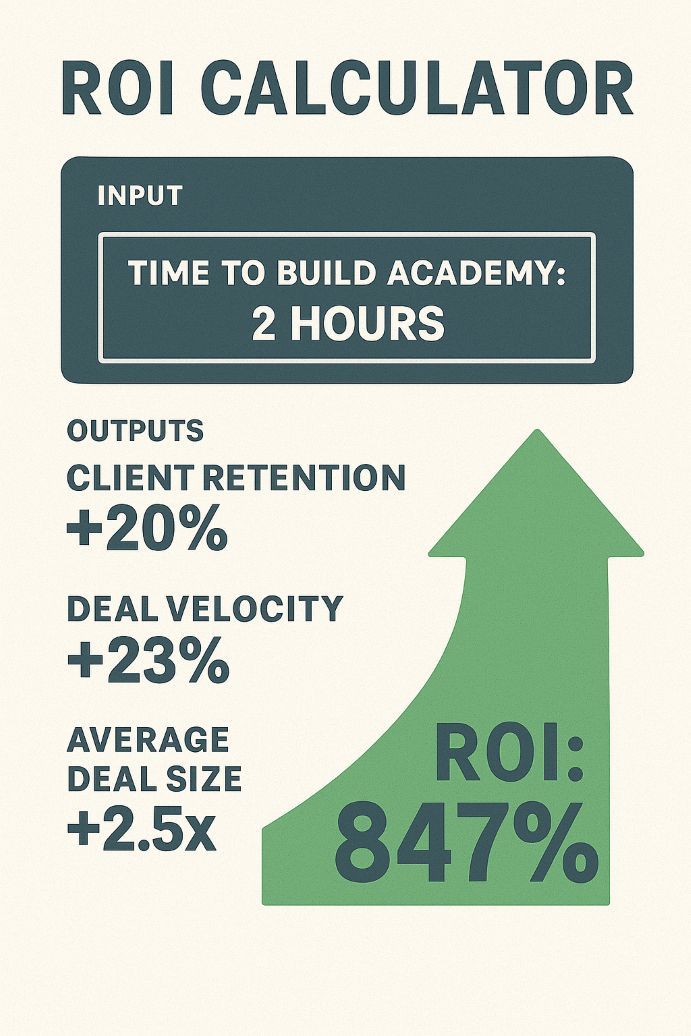
Full transparency: This is exactly why we built FreshLearn. We saw HubSpot agencies stuck in the Vendor Trap, and we built a tool that integrates with HubSpot to help them layer education into their client experience. No infrastructure. No complexity. Just branded academies that change how clients see you.
But whether you use FreshLearn or build something yourself, the principle is the same: Teach, don't just do.
The Bottom Line
Your clients don't see you as a vendor because you're bad at what you do.
They see you as a vendor because you haven't shown them the expertise BEHIND what you do.
Let me say that again, because it's important:
You're great at your job. The problem isn't your work. The problem is they don't understand WHY your work is great.
The shift is simple:
- Fix your onboarding (build a branded academy)
- Add education to every deliverable (teach, don't just do)
- Build your industry academy (become THE expert in one vertical)
It takes 2 hours to set up.
It changes your business forever.
The question isn't whether you CAN do this.
The question is: Are you ready to stop competing on price and start being seen as the authority you already are?
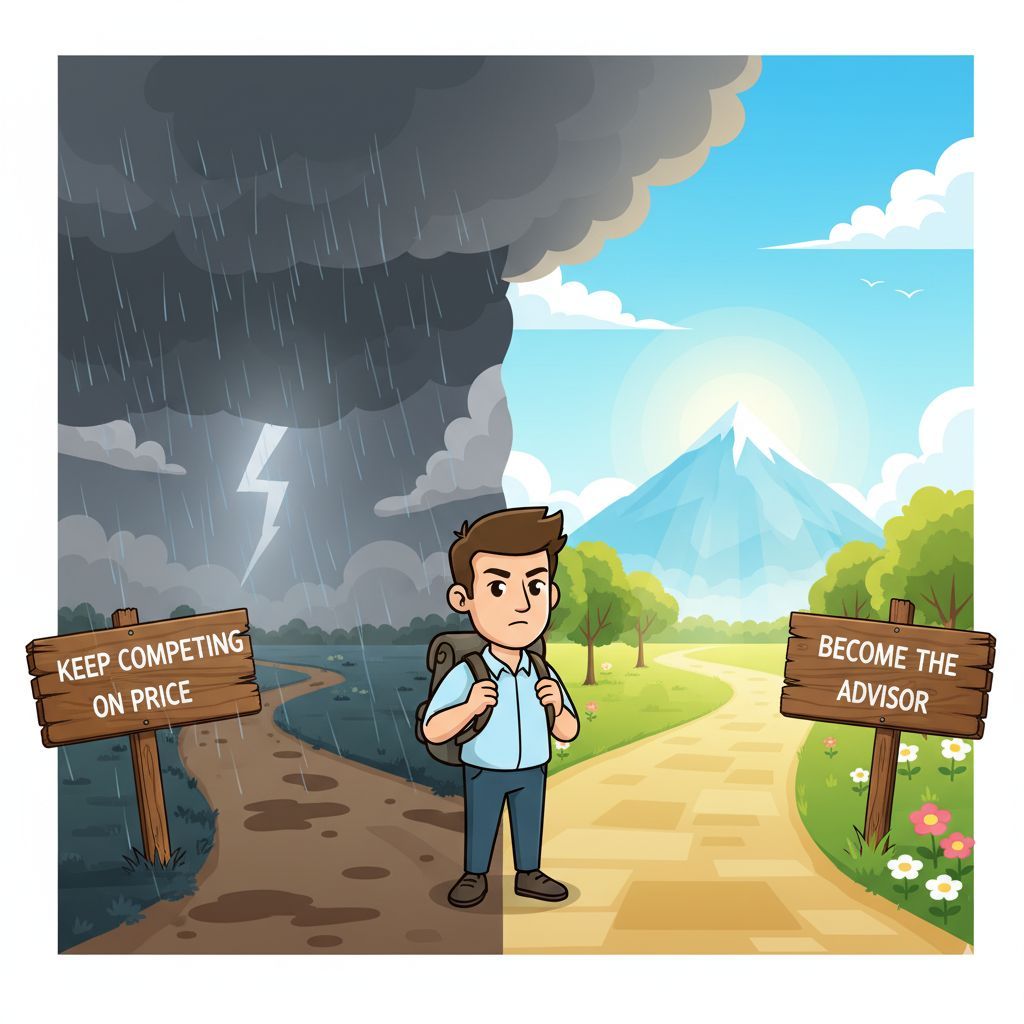
What's Next?
If you're ready to make the shift, here's what I'd do:
This Week:
- Audit your current onboarding (be honest — does it scream vendor or advisor?)
- List out all the content you already have (decks, videos, frameworks, templates)
- Pick your favorite client industry (the one you'd love to specialize in)
Next Week:
- Organize that content into an academy structure
- Record a welcome video (5 minutes, your face, your voice)
- Set up your first client academy (even if it's rough)
This Month:
- Launch it with your next new client
- Watch their reaction
- Iterate based on feedback
Want to see what a branded agency academy actually looks like in action?
See examples or book a 15-minute walkthrough with our team. We'll show you exactly how agencies are doing this (and we'll be honest about whether it makes sense for you or not).
Now go teach something.
Your clients hired you because you're the expert.
It's time they actually see it.
— Rahul
CEO, FreshLearn
P.S. If you're thinking "This sounds great but I don't have time," let me address what you're really feeling: You're worried this is one more thing on your plate when you're already drowning.
I get it. But here's the thing: This SAVES you time. When clients understand what you're doing, they ask fewer stupid questions. When they see you as an advisor, they trust your recommendations instead of second-guessing everything. When they're educated, they're less needy.
The 2 hours you spend setting this up will save you 10+ hours per client over the next year.
That's the truth.


